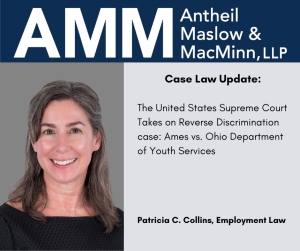THE UNITED STATES SUPREME COURT TAKES ON REVERSE DISCRIMINATION CASE
Reprinted with permission from the October 14th edition of The Legal Intelligencer. (c) 2024 ALM Media Properties. Further duplication without permission is prohibited.
On October 4, 2024, the United States Supreme Court granted certiorari to hear Ames v. Ohio Department of Youth Services, a case from the United States Court of Appeals for the Sixth Circuit. The Plaintiff in Ames alleged discrimination on the basis of her membership in a majority group – that is, Ames is what has come to be known as a “reverse discrimination” case. The case will resolve a split in the circumstances regarding the evidence required for an employee to make a prima facie case of “reverse discrimination”, and could require employers to reevaluate their diversity, equity and inclusion programs.
Mariam Ames is a straight woman, who was employed by the Ohio Department of Youth Services as an administrator. Ms. Ames applied for a promotion and was told during her interview process that she should retire. After the interview, Ms. Ames was demoted, and a gay male was hired to fill her administrator position. A gay woman was hired to the position for which Ms. Ames sought a promotion. Ms. Ames claimed that the Ohio Department of Youth Services discriminated against her on the basis of her sexual orientation. The United States District Court for the Southern District of Ohio granted the employer’s motion for summary judgment, finding that Ames had not shown the “background circumstances” necessary to support a prima facie case that the employer discriminated against a member of the majority group. The court applied the burden-shifting analysis in McDonnell Douglas Corp. v. Green, 411 U.S. 792 (1973), as courts do in all discrimination cases. The Sixth Circuit affirmed, citing its previous holdings that require reverse discrimination plaintiffs to make an additional showing to the McDonnell Douglas prima facie case. Not only was Ames required to show the “usual” prima facie elements, she must also show “background circumstances” to support a reverse discrimination claim. The Sixth Circuit noted that Ms. Ames easily made a prima facie case: her claim was based on sexual orientation, a protected class under Title VII; she was demoted from a position for which she was qualified; and she was replaced by a gay man. But, according to the Sixth Circuit, the case “foundered” on Ms. Ames’ failure to show the required “background circumstances”. The Sixth Circuit noted that reverse discrimination plaintiffs generally meet this “additional” burden, in the absence of direct evidence, by presenting evidence that a member of the relevant minority group made the decision at issue, or that there is statistical evidence of a pattern of discrimination by the employer against members of the majority group. The Supreme Court granted certiorari, and the case will be heard in the upcoming term.
Van Buren v. United States: The Supreme Court Eliminates a Remedy for Employers
Reprinted with permission from the June 21st edition of The Legal Intelligencer. (c) 2021 ALM Media Properties. Further duplication without permission is prohibited.
Since its enactment in 1986, employers have used the federal Computer Fraud and Abuse Act, 19 U.S.C. §1030 (“CFAA”) to vindicate violations of the employer’s workplace policies regarding use of computers, email accounts, and other electronic information by departing employees. The CFAA inevitably appeared as a claim in an employer’s complaint to address such conduct as downloading information from work computers and email accounts, or wiping devices and removing valuable information. The CFAA potentially provided relief where the information taken might not meet the definition of a “trade secret” in the federal Defend Trade Secrets Act (18 U.S.C. §1986), or Pennsylvania’s Uniform Trade Secrets Protection Act (12 P.S. § 5302). Further, and perhaps providing leverage for employers, the CFAA provided a criminal remedy for such violations. In Van Buren v. United States, 592 U.S. ___ (June 3, 2021), the United States Supreme Court may have eliminated that claim for wronged employers.
The CFAA prohibits intentionally accessing a computer with or without authorization or exceeding authorized access of a computer. The Act defines “exceeding authorized access” as accessing a computer with authorization and using that access to obtain information in the computer to which the individual is not otherwise entitled. The CFAA imposes criminal liability for violations of these prohibitions. It also imposes civil liability through a private cause of action if there is “damage,” meaning, an impairment to the integrity or availability of data, a program, a system or information.
Supreme Court Expands Title VII Protections to Prohibit Discrimination on the Basis of Sexual Orientation and Gender Identification
Reprinted with permission from the June 19th edition of The Legal Intelligencer. (c) 2020 ALM Media Properties. Further duplication without permission is prohibited.
The Supreme Court of the United States held in Bostock v. Clayton County, Georgia, 590 U.S. ___ (US 2020) that Title VII’s prohibition against discrimination on the basis of sex also bars discrimination on the basis of sexual orientation and gender identity. The Court’s opinion relies on the text of the statute, rejecting arguments from employers regarding the failure to specifically include gender identity or sexual orientation in the statue. The Supreme Court’s decision in Bostock is historic – it expands the protections of Title VII to sexual orientation and gender identity, protections previously denied. The Court’s ruling requires employers to update and modernize their policies and procedures, hiring practices, training and workplace culture.






















